Time Does Not Bring Relief
“History is written by the victors” is one of those cliches that’s so obviously true that it requires next to no explanation. But the ability to provide evidence for what the victors do when writing history is usually a bit more circumspect and tricky to get ahold of . . .
Last Thursday, the Nobel Prize for Literature was awarded to two white Europeans: Olga Tokarczuk (one of the odds-on favorites going into the announcement) for 2018 (aka the “Year that the Sexual Abuse Scandal Killed the Nobel”) and Peter Handke for 2019.
I never wanted to write a Nobel Prize post—these posts are meant to be about baseball and the process of reading. About using different outlooks (like Big Data and sabermetrics) to come up with fun, weird ways to provoke people to think about books and publishing in a more nuanced, different way. Do they succeed? Probably not! But I’ll be back soon with a “normal” post about reading Saer’s The Regal Lemon Tree (forthcoming from Open Letter in winter 2020) without any recollection of what the book was about and being totally knocked sideways on several occasions, wishing someone else was in charge of writing jacket copy so that I could get a handle on what this book was about.
But for today? Let’s talk about fascism, two moments in history, and whether the Nobel Prize is totally bankrupt or not.
*
Scene: Thursday Morning. 4:30am. I wake up in an excited panic. There was speculation that Can Xue or Dubravka Ugresic could win the Nobel Prize. The committee had stated, publicly—although, as we came to find out, facetiously—that they had been too Eurocentric and would be looking to other parts of the globe for their big honor. So, Can Xue? Or Murakami? Probably Murakami. And probably Olga Tokarczuk—the committee will want to be “of the moment,” and given the way the English-speaking world serves as the de facto force behind what is popular and trendy (both of the recent titles from Tokarczuk to come out in English translation are from 2007 and 2009, but we’ll come back to that in her section), it felt like a foregone conclusion.
In the midst of a Cardinals blow out in game 5 of the NLDS (which is pretty much the pinnacle of hope and joy for me) I had a dream moment . . . a second where I thought, “what if?” I mean, a Swedish (!!) press had contacted us about Can Xue’s rights earlier in the week—just as her odds shifted. Is that’s a coincidence? A conspiracy? A reason for hope? A prank??
But deep down, I knew. I knew. Would it be great to sell more copies in a week than we have in all eleven years of our notable, but financially suspect existence? Fuck and yes it would! But, you, know, there are only like 50 other living authors equally deserving of a million dollar literary award and a place in history . . . it all feels like a coin flip, and there are three things I don’t think exist in today’s world: true democracy, anything resembling meritocracy, and good luck for anything Chad W. Post is involved in.
It took until 4:36am to figure out what the time it was in Sweden—not time for the announcement!—and then it took until 6ish to finally fall asleep, cautiously hoping that I’d wake up and the world would be a different place.
Fast-forward to 7:15am. Handke! Handke! Sure, he’s an Important European Author, but Handke! This guy was friends with Slobodan Milošević, who, if you’re too young to know the history of the Yugoslav War and his attempts at genocide, well, let’s just say he’s one of history’s greatest monsters. Full stop. Don’t @ me with equivocations. If you encourage people to slaughter others based on their nationality, you are 100% a piece of shit.
Are Handke’s books good? I haven’t read all of the recent ones, but the early ones are, yes. Really good. But Repetition is boring and solipsistic, and the second-half of his career feels like someone so intent on loving themselves that they don’t realize how far up their own ass they are.
From Wikipedia, which I’m quoting because . . . well, you’ll see:
My Year in the No-Man’s-Bay (German: Mein Jahr in der Niemandsbucht) is a 1994 novel by the Austrian writer Peter Handke. It follows a writer’s attempt to describe a metamorphosis he went through two decades earlier, when he stopped being confrontative and instead became a passive observer. The task proves to be difficult and most of the book is instead concerned with the lives of the narrator, his family and the people in the Paris suburb where he lives. The book is 1066 pages long in its original German. It was published in English in 1998, translated by Krishna Winston.
When the English translation was published in 1998, Publishers Weekly‘s critic wrote: “Despite attaining moments of stylistic lucidity worthy of Montaigne, the narrator more often comes across as gloomy and hostile. Nonetheless, numerous trenchant moments of insight make this work intriguing and provocative.” Lee Siegel reviewed the book for The New York Times. He described it as “one carefully observed image after another expanding into a cinematically eternal present tense”, which according to Siegel means that “in a sense, then, Handke’s novel is an argument for the superiority of film to the novel”. The critic continued: “Though at times intellectually bracing, this can make for pretty arid reading. And Handke’s attempts at elevating his epic of self-regarding banality often make matters worse. Rejecting character, plot and psychology as mere fictions, he relies on an ostentatious thematic framework that winds up being more implausible than any old-fashioned novelistic trick.” Publishers Weekly called the English translation “impeccable”, while Siegel called it “clumsy and overliteral”.
Yeah, I’m good. I’ve read this sort of man for many many years. And I really, really liked it. But then again, there are a million dudes writing in this same way, who may not get the international play (why do some writers succeed and not others? definitely not because of talent, I’ll guarantee you that), none of whom told Bosnian Muslims that the Srebrenica massacre was faked and said “You can stick your corpses up your arse!” when called out on his wild claims. Christ. This guy. Really. A million dollars.
And that’s just the start of it! Here are the screen caps I frantically took at a red light, driving my son to school, stunned that anyone who’s openly friends with war criminals won the Nobel Prize for Literature: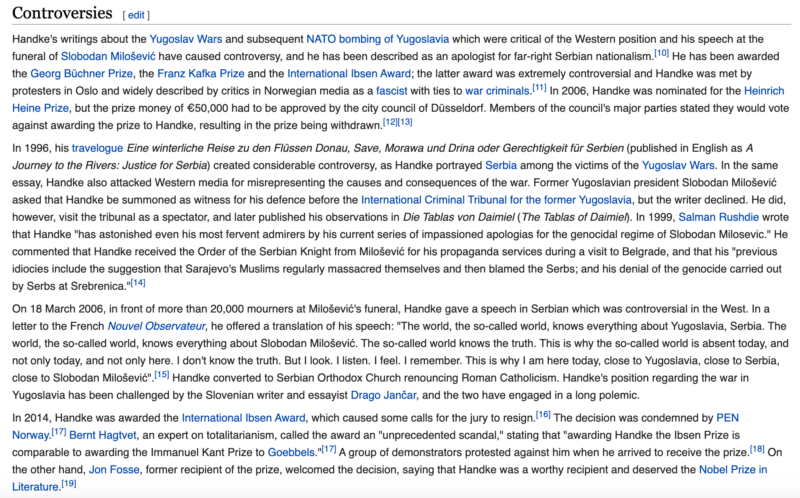
I know it’s long, but read this. And read it here. Why? Because it’s been completely deleted from Wikipedia. Not bits and pieces—the whole thing. Peter Handke has no controversies.
The victors write history. Which is why “Never Forget” is not a phrase, but a warning.
*
While at that same red light, I whipped off an ill-conceived tweet (when are my tweets not ill-conceived) and got so worked up about the podcast Tom Roberge and I were about to record. It’s called “Don’t Give a Million Dollars to a Fascist” and it is FIRE.
It also earned me the designation—on Twitter, the home of all intellectual thought?—as the “most insufferable man in publishing.” Which is AMAZING. I added this to my bio and will be riding it to the grave.
Chad W. Post, the “most insufferable man in publishing” died on XX in the year XXXX. He is known for: a) being blocked by Roxane Gay because of a drunken Super Bowl exchange regarding a half-time show, shitty referees, and nonsense (which he regretted all his years), b) complaining on Three Percent that no one liked his books (making it easier not to like his books), and c) the fact that he was very, very short, with a nasty balding situation.
I get the ire. The backlash to the “Handke doesn’t deserve it” backlash. I really do. There are authors I/we like that are not good people. And the work and the human who makes the work are two separate things—when you’re talking just about books. When you’re talking about giving someone a million dollars and a permanent spot in history? . . . I’m not so sure that argument holds. Or maybe it would’ve held, if the committee hadn’t had said anything. Instead of expanding their scope to, I don’t know, anyone in Latin America? Asia? Africa? Last I checked, Poland and Austria were very, very European. (And don’t pull this “Eastern Europe” shit. The center of Europe moved East very fast with Brexit.) And very, very, very white.
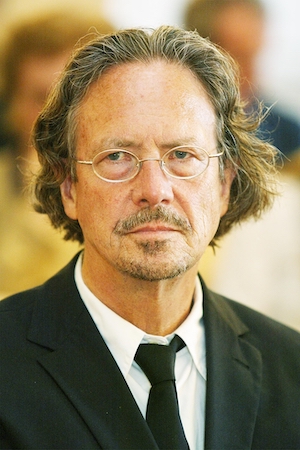 The thing is, you can claim that the Nobel is only about an author’s work, that the work is not the same as the person, but for an award of this stature that’s given out once a year to an author and their corpus, it comes to function as an award for the author themselves—at least in the minds of tens of thousands of people around the world. So whether you feel like the Nobel Prize for Literature should “only be about the work” or not, it functions as something larger within culture, and as a result, the Swedish Academy needs to keep that in mind.
The thing is, you can claim that the Nobel is only about an author’s work, that the work is not the same as the person, but for an award of this stature that’s given out once a year to an author and their corpus, it comes to function as an award for the author themselves—at least in the minds of tens of thousands of people around the world. So whether you feel like the Nobel Prize for Literature should “only be about the work” or not, it functions as something larger within culture, and as a result, the Swedish Academy needs to keep that in mind.
I think someone subtweeted about me, claiming that my Handke outrage was linked to the fact that Dubravka Ugresic didn’t win. This isn’t entirely true. Am I upset that Dubravka didn’t receive the prize? Not exactly. Once you’ve been a bridesmaid for so long, it’s impossible to get angry when you miss the bouquet once again. But I am irritated on her behalf, since anyone who suffered through the Yugoslav War will 100% have their PTSD triggered when a genocide apologist who supported war criminals is awarded a million dollars. Especially women who suffered horribly through this conflict. It’s really cool that some white Austrian can take a shit on a region, and still be rewarded for it. Bully for him. It’s like telling Trump that “it’s OK, at least you’re trying.”
Dubravka was literally threatened by nationalists of the Handke sort. She was doxed in the national paper. People thought it was their patriotic duty to threaten her physically. Her work is still discriminated against because she’s not on board with ugly nationalist sentiments. She’s written more about border crossings, immigration, the impact of violence in the Balkans, the power of art, creation and the culture industry, than any living writer.
So, sure, Handke is a very talented Classic Male European Writer, but given the Academy’s statements, the scandal last year, the fact that most people think of them as a joke—a group of old white men selecting the buddies and idols they’d like to hang out with—that the impact of their decision far exceeds what it rationally should, that it would’ve been easy to choose anyone else . . . That’s why people say #EatShitHandke and #GivetheNobeltoDubravka. (No one actually says that, but they could and should. Hell, add #BoycottTheNobel to that.)
Again, white middle-aged literary guys—I’m one of you. I’m all about Art First. About complicated prose that’s contemplative and very wedded to History and Ideas. I’m all of those things, and I know why you’re pissed at the backlash against Handke, who embodies this very particular viewpoint more than anyone else I can name. (Just look at his pictures and you know what his books are like.) But you’re wrong this time. This isn’t the moment to try and stand for that argument. We live in the worst possible timeline, with everything completely falling apart—to pour fuel on that fire in order to defend your rights to choose whichever White Euro Male you want to receive Alfred Nobel’s money? That’s just plain irresponsible.
Dubravka and Can Xue and Everyone Else has to wait another year. And next fall, we’ll all be disappointed again. It’s an impossible situation. And, man, if an author Open Letter published won? The “we don’t even know who this is” think-pieces would lead me to suicide or heart attack. (THAT IS NOT A JOKE.) Instead of stumping for Dubravka, I think what we should argue for is the complete dissolution of the Swedish Academy. They’ve outlived their usefulness, are a pathetic group of trolls, and can’t even explain their decisions in English.
Seriously, this is your defense of Handke?
for an influential work that with linguistic ingenuity has explored the periphery and the specificity of human experience.
You know what that sounds like? Senility.
Even a random word generator can do better.
*
On the flip side—and there are think pieces to be written about this, about the two sides to the Nobel coin—Olga Tokarczuk is great! I’ve met her in person, and she’s really fun. Besides, she has dreads, and her books are good. Her first translator, Antonia Lloyd-Jones, is one of my favorite people to see at book parties. Jennifer Croft—who did Flights—and is working on The Books of Jacob (which would make a good Two Month Review book?) translates from Polish and Spanish, and received a glowing review in the New York Times for her memoir, Homesick. These are talented, deserving artists—congrats to all of you! (And all of Olga’s other translators. I don’t know who they are, but it should be noted that these books are available in more languages than just Polish and English.)
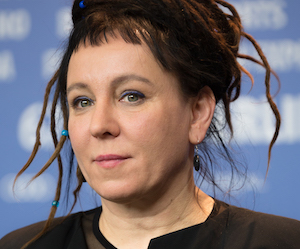 Without neglecting any of the current players in Olga Tokarczuk’s current English-language moment—Riverhead, Fitzcarraldo—I want to go back in time. To 2002. To when the world first discovered Olga’s writing.
Without neglecting any of the current players in Olga Tokarczuk’s current English-language moment—Riverhead, Fitzcarraldo—I want to go back in time. To 2002. To when the world first discovered Olga’s writing.
2002 was the year that Tokarczuk’s fifth book, House of Day, House of Night came out from Granta UK in Antonia Lloyd-Jones’s translation. One year later, it was available stateside from Northwestern University Press as part of their “Writings from an Unbound Europe” series, which, if you don’t already know and you like Euro-lit, get thee to a library and/or used book store.
I have two personal comments about this series, one that could get me in a lot of trouble if powerful people ever read this blog: 1) This series changed my reading life, and 2) It’s the reason Sessalee Hensley at Barnes & Noble doesn’t really carry our books. (“Translations don’t sell. I carried Northwestern for years.” That’s verbatim.)
From The Guardian‘s review of House of Day, House of Night:
Olga Torkarczuk claims her place among the greats of Polish letters with House of Day, House of Night
What other nation can boast two living Nobel laureates – Wislawa Szymborska and Czeslaw Milosz – and, in the late Zbigniew Herbert, a poet at least their equal? Add to these Ryszard Kapuscinski, Slawomir Mrozek and Pawel Huelle and the debt we owe to Polish letters becomes clear. It’s a distinctive list that draws on a powerful collective faith and an irony that often seems the only sane approach to the cruel joke of Polish history.
With House of Day, House of Night, her first full-length work here, Olga Tokarczuk can rightfully take her place among these writers. It is not so much a novel as a collection of linked short narratives, found stories, hagiography and incidental observations and is a delight to read – wonderfully inventive and by turns comic, tragic and wise.
That’s some strong praise from a very well-respected source!
How did the Northwestern edition do?
From the Northwestern book page (which has the same reviews as Amazon.com):
When I whinge and whinge about how American book culture is stupid . . . yes, I’m being a pompous, insufferable dick. But, c’mon. That’s it? Nothing on Publishers Weekly . . . who LOVED her new books.
Is History nothing but a Tale of Good Timing? Or something more sinister? A way of making sure power stays in power? Or a cruel joke? It’s easy to lean into any of these interpretations—especially if you read this book (in 2003!) and pursued Olga for years, but have been denied for one person’s opinion or another’s. (What is it like to be self-confident?)
Let’s flash ahead to Olga’s best book: Primeval Tales and Other Times, which was translated by Antonia Lloyd-Jones as well and published by the incomparable Twisted Spoon. (So many good books! So little attention from American booksellers/reviewers/readers. Personal recommendation: The Maimed by Hermann Ungar.)
As you can see from their page, Primeval got way way way more play than House of Day, House of Night. Although, again, no PW, but there is Booklist. No New York Times, but a Words Without Borders review. The Review of Contemporary Fiction reviewed it (probably why I knew of this particular book) and World Lit Today, but, let’s be honest: today’s tastemakers don’t care about RCF or The Modern Novel, although check this blurb from Malvern Books (!!):
This is Primeval: an enclosed snow globe, a world in itself, which it may or may not be possible to ever leave. Outside, wars rise and then break like waves, disgorging soldiers and refugees through the border of Primeval, whose residents are swept up in the flood without always being entirely certain whether the outside world really exists. [. . .] History, in this novel that spans the bulk of the twentieth century, is a thing that happens elsewhere, a dream that, like Goya’s Sleep of Reason, gives birth to monsters.
No other indie bookstores have mentioned this title to me over the past nine years. But I did buy my copy from City Lights way back when.
*
What is history if not for its forgotten players?
Olga’s Nobel is going to be about Riverhead and Fitzcarraldo because, well, memory is short and immediate. And good for them! That tracks, makes sense, and will keep two admirable publishers publishing good books for decades to come. But if she’s such an obvious Nobel Prize candidate, why do her four English translations have these pub dates: 2002, 2010, 2018, 2019? Four books in 17 years? Here’s her bibliography (arranged as if by a madman on the “infallible” Wikipedia):
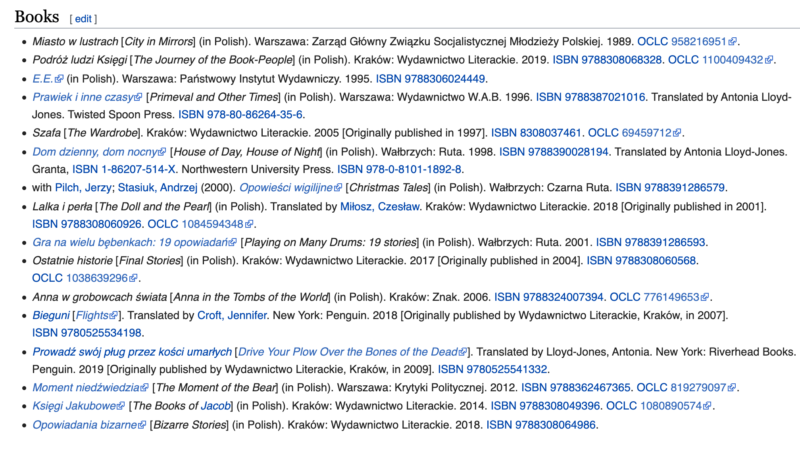 What are we even doing here? Is there a meaning or message behind the awarding of the Nobel Prize? Is it just random? Is it about trends and popularity and Man Booker Awards and glorification of those who got there at the right moment? Is History written not by the victors, but by the people with the best timing?
What are we even doing here? Is there a meaning or message behind the awarding of the Nobel Prize? Is it just random? Is it about trends and popularity and Man Booker Awards and glorification of those who got there at the right moment? Is History written not by the victors, but by the people with the best timing?
*
This is actually supposed to be a post about Susan Harris, editorial director of Words Without Borders, former editor-in-chief of Northwestern University Press, and publisher of three Nobel Prize winners—all of which came after her tenure at NUP ended.
In addition to doing Olga Tokarczuk in 2003, she published two Herta Mueller books—Land of Green Plums, which she acquired paperback rights to from a commercial house, and Traveling on One Leg, which was hers alone—and a couple Imre Kertesz titles—Fateless she inherited, but Kaddish for an Unborn Child, she acquired. And, because she was “let go” in March 2002, just months before Kertesz won the Nobel Prize, her editorial contributions were erased from history. She got none of the profile pieces, none of the glory or recognition.
*
Except among us.
Thank you, Susan, and I can’t imagine how weird it must be to “win” three times, and yet . . . But then again, is there an organization focused on international literature that’s more respected than Words Without Borders? The Grandmother of All Websites, WWB is legit AF. They’re the Grand Street of post-millennium publishing. Wait, you don’t know what Grand Street is?

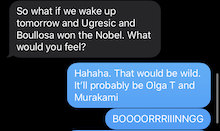
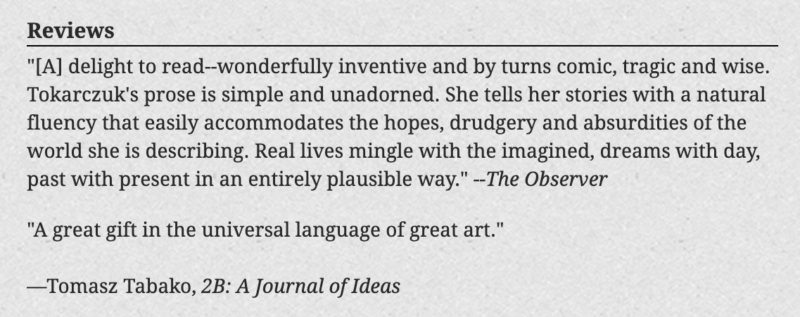
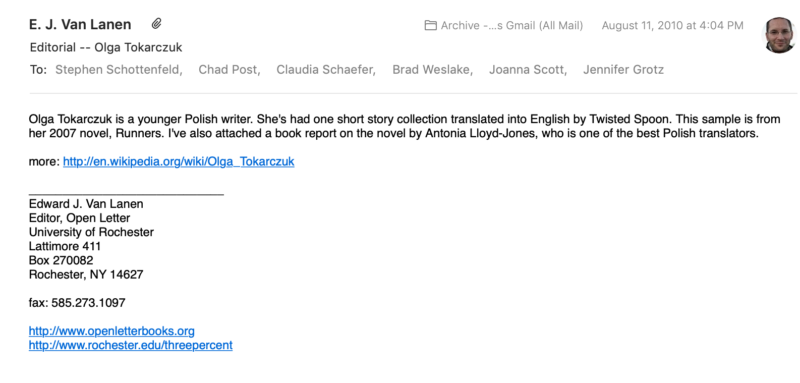
[…] * ‘The Bob Dylan of Genocide Apologists.’ Fascism and the Nobel prize. […]